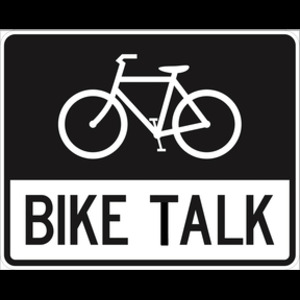There was a time when I was a pretty good wrench.
Needless to say, that was before I married a woman who objects to finding greasy bike parts scattered all over the living room.
I took great pride in building my own wheels, carefully lacing the spokes in the traditional interlaced pattern. And twice each year, I would strip my bike down to the frame and rebuilt it; lubing, tightening and aligning every part until it rolled smoothly, in perfect silence.
But it never occurred to me to assemble an odd collection of mismatched parts and build my own bike from the rubber up.
Yet that’s exactly what Amanda is doing.
Even though she’s only been riding for a couple years. And even though she didn’t even know how to fix a bike when she started. In fact, one of her reasons for doing it was to teach herself bike mechanics as she goes along.
The author of Life Without Wheels, Amanda — better known by her online persona, Dancer a la Mode — started riding because she couldn’t afford a car. Then continued because she fell in love with it, joining in on group rides and doing solo centuries and double centuries, as well as commuting to and from both her jobs.
And all that on a bike that’s too big for her.
She needed a new bike, one that actually fit. One that would allow her to ride even longer distances, as well as take up racing, her next two-wheeled challenge.
So she decided to build it herself.
And that’s when the problems began.
She went to the local bicycle co-op in her neighborhood, the Bicycle Kitchen — the city’s first and still most respected co-op — and asked for a little help. And walked out discouraged and empty handed.
I’ll let her explain.
Let me say that I understand the purpose is to teach you how to work on your bike. It’s not a bicycle shop and it’s not a repair shop. I get it. I wasn’t asking for either.
My first off-putting experience was when I came into the Kitchen during ArtCycle. I explained that I wanted to build a bike from scratch as a learning project, but also to ride, and asked what kind of frames they had. Now, based on everything I read, that’s exactly the kind of project you can do at the Bicycle Kitchen, exactly what it’s there for. But the “cook” there just looked at me and said, “well, we don’t sell frames”. I made it clear, again, that I wasn’t looking to buy a bike, I wanted to build one, myself, I would need some direction, but this wasn’t about “buying”. The cook continued to brush me off, so I left with my friends and went back to ArtCycle. My impression was that they just didn’t want to help me. I was very sad and had to wonder what this “community” was really about if these leaders in the community were going to discourage me for some reason or, dare I say, bias of their own.
Maybe there really wasn’t anything they could do. Or maybe they didn’t take her seriously. But either way, instead of trying to find a way to help or encourage her, the person she spoke with turned his back on her — figuratively, if not literally.
Even if they couldn’t do what she asked, someone could have taken the time to guide her by discussing various types of frames, or offered suggestions on where to find a good used frame. Or they could have simply suggested that she come back the next day and talk to someone at Orange 20 Bikes directly across the street.
And then offered to assist her in building her bike once she found one.
But instead of offering encouragement, the answer was simply “we don’t sell frames.” So she walked out the door, empty handed and disappointed.
A lot of people would have quit right there.
But clearly, Amanda isn’t the type to give up. So she went ahead and built it anyway, doing the research on her own to discover what she needed and how to install it. And slowly assembling, not just a bike, but the skills required to build it.
And then it happened again.
So I embarked upon my bike build myself. I went to swapmeets, garage sales, searched online, and compiled used parts for my project over the course of a few months. Every time I talked to people about my search for parts they would say, “oh, you should visit the Bicycle Kitchen.” I had to shake my head sadly and say I’d already tried that. However, as I began to assemble the bike, in my living room on the floor without a bike stand, I realized I needed an integral part to install my shift and brake cables. Last night, on a group ride, we stopped to show an out-of-town guest the Bicycle Kitchen. I went inside, explained that I was building a bike at home, and needed a cable clamp for the downtube. The cook politely showed me a cable clamp but would not give or sell it to me. He said, “We’re not really a bicycle shop. You can bring it here and work on it.” I explained to him that the bicycle was in pieces, I don’t own a car, and I would have to carry it here, which isn’t really an option, because I’m not walking through Hel-Mel and Koreatown at night, carrying my bicycle (and let me be clear, nighttime is the only time I have to work on this project). It’s absolutely ridiculous that he even expected me to. Hello! There have been muggings, and recently cyclists have been held at gunpoint for their bikes in this area! I’m a 30-year-old woman, and while carrying the bike isn’t the problem, I paid good money for all the parts I had to compile, since the Kitchen wouldn’t help me in the first place. I wasn’t trying to use them as a shop. I had a legitimate need, a legitimate situation, and could’ve used a little help. Regardless of my explanation, I was again refused any help and left very angry that I was being told that the only way I could get help was to do something I deemed dangerous.
Now, don’t get me wrong.
This isn’t a criticism of the Bicycle Kitchen. Until I read Amanda’s letter, I’d heard nothing but good things about them. And I wasn’t there either night, so I can’t comment on what really happened, or who was right or wrong.
It’s a reminder that if we really want to build our bicycling community, we need to take a situation like this and turn it into an opportunity to encourage less experienced riders. Whether that means offering advice on how to ride in traffic, how to buy a bike or where to get the parts they need.
And whether we write a blog, work in a bike shop or serve on the board of a biking organization. Or just encounter a rider having a little difficulty on the road.
Not everyone has Amanda’s determination. And it’s a lot easier to give up than to struggle though on your own.
I nearly did the first time I tried to replace a busted wheel.
I couldn’t afford a new one, and the staff at the local bike shop took one look at a beginning rider with no idea what he was doing, and dismissed me on the spot.
They told me that I couldn’t build one of my own. Too hard, too complicated, something only the most experienced riders should even attempt.
So I turned and walked away, deeply discouraged and ready to quit, since I couldn’t ride on one wheel. Then another customer stopped me on my way out the door.
He took the time to explain the different types of rims, helping me select the right ones for my bike, budget and style of riding. Then he helped me find the right spokes, explaining how to lace them and get the tension just right.
It wasn’t his job. But he cared enough to encourage a total stranger.
And over 25 years later, I’m still riding.
And still grateful.






Thanks for this write-up! I do wanted to add that regardless of what happened at Bicycle Kitchen, a number of cyclists (from across the US) have offered advice and solutions to problems I’ve run across via Twitter. They’ve acted as quasi-instructors to me. Like you, I experienced help in a way I didn’t expect it, like John Huan Vu, who has been answering questions and offering solutions endlessly almost everyday for the past week.
I hope to have the bike ready for Critical Mass this Friday. (Fingers crossed!)
Great article — and a lesson that can be applied to anything. Never be discouraged by people who don’t have an interest in helping you. It can happen anywhere. There are always people who can and will help, glady — if you can find them. And that’s where determination comes in.
Great story. And thanks, Amanda, for being so persistent. It’s very inspiring.
I am glad that Amanda got her bike together… I think I am one of the people who suggested that she go to the Kitchen.
In the Kitchen’s defense, I have to say that I’ve referred probably about a dozen folks (women and men) to it who have come back to me with positive reviews.
Well, I don’t think badly of the Kitchen at all. I do think that maybe some additional volunteer training would help. On my own blog, I got quite a few comments that, while everyone agreed that the opportunity the Kitchen provided was great, the volunteers could be less than helpful or friendly. I hope I can use my experience to get involved at the Kitchen.
The Bike Kitchen doesn’t sell parts for use on projects being worked on outside of the Kitchen. It says so on the wall in there to the best of my recollection it also says You have to work on your project there. They have to pay bills like the rest of society unfortunately part of their business model is renting the stand. pretty standard stuff at the co-ops here in town and across the nation.
I’ve shadowed at the BK a few times and tell ya what, the place is a mad house with people wanting assistance and wanting to just grab parts and leave. Not at all saying you are one of them Amanda but when I volunteered there I could totally see how the cooks were being worn out by freeloaders who raid their parts supply of the good stuff and walk right out the door. It sucks. I bet it truly gets overwhelming at times. Maybe you could try to see it from the other side rather than just putting out messages of helplessness and despair into the ethos… As in, sure, sometimes there’s a cook or person volunteering that isn’t gonna give you the best service, in fact the service might suck… but again, they are doing it for FREE so you have to take that volunteer service with a big ole chunky grain of salt and just put up with a little rudeness. Something is obviously working over there cause I see lines at the door everytime.
Maybe they were giving you the cold shoulder because your excuses are so flimsy… There are many many solutions to your dilemna of not being able to commute to the Bike Kitchen with your project bike. How about just ask a car driving friend for a ride? save 25 cents in a special piggy bank every day for a month (or whatever the math is) and take a cab? I bet you could even persuade one of the kind souls at the BK to haul your bike up from Ktown on a trailer…?
The place can be intimidating and it’s always packed but seriously, you’ve done unsupported double centuries you can wrangle this problem I believe in you.
Roadblock, it’s great to see you completely ignore the first part of my story so you can point the finger at me and say that I’m just asking for too much and not trying hard enough. I went there to build a bike–to rent stand time, pay for any parts I used, and support the business. You’re saying that because these people are volunteering that they can be inhospitable or provide poor client relations? I work with lots of volunteers in my field. I have specialized in nonprofit development for most of my career and whenever I bring in volunteers who deal with the public, clients, or even other colleagues, I train them fastidiously to be polite, friendly, and diplomatic. I teach them to deal with a diverse range of personality types. Being a volunteer doesn’t give you the right to be a bad volunteer or to be rude.
Whenever you apply for a grant, one question funders always ask is how you the services you provide are accessible to the public, and this can mean a range of things including how the volunteers or employees interact with the public: are they trained to deal with a variety of populations such as women, non-English language speakers, and the disabled? It can also mean accessibility of hours and location. If your volunteers have carte-blanche to behave any way they want to clients (since the Kitchen is a service provider) then you’re not being very accessible, are you?
Thanks for believing in me, but when I say these things or bring up these topics, it’s not because I hate the Kitchen or the cycling community. It’s because I see women and men who will never get on a bike because they run into behavior and mindset like this. And there have been a lot of blogs and articles lately that hit on this point: cycling as transportation and not as life style, etc. There are all these people who fall in between, but they won’t be as determined as me, and we lose them forever.
A friend of mine recently made off with an incredible buy of a road bike in great condition for $25. The catch? The woman selling it thought it was in terrible condition because the tires were out of air. Not to put aside the great buy for my friend, but maybe it that woman didn’t feel so intimidated inflating her tires she would be riding a bike right now. But obviously, inflating the tires was a big obstacle for her, but not for my friend. Which leads me to…
What is not a big obstacle for you might be a big obstacle for some one else. Just like riding 100 miles is not big deal to me but is a huge deal for some one else. Dragging my frame and parts there (or paying for a cab, are you crazy?) is the obstacle that stops me. We all have our limits of how far we will go. But, when a client comes to you looking for solutions, having none doesn’t make you look too good.
For example, when I came in to talk to the cook about building a bike, he could have said “come in on Mondays, it’s Ladies Night, we can sit down and figure out a plan or get started.” He could have said “call and make an appointment so you’ll have stand time.” He could have said “if you’re looking for a specific frame, you’ll probably need to get that yourself, but we can help you assemble the components and get it rolling…” He could have made any number of suggestions that would have been an entry point, but he didn’t.
Forgive me if I want/expect my local co-op to provide great service to everyone and be the most awesome place ever. Maybe it’s just because I believe in them too much.
“volunteering that they can be inhospitable or provide poor client relations?”
yeah, that’s basically what I’m saying. It’s just the nature of free stuff. You don’t always get what you want. regardless, they have waaaaay too much business over there so maybe you should try a less busy bike co-op if they aren’t doing you right.
[…] follows hot on the heels of Rogers criticizing the Bike Kitchen based on another blogger’s negative review – an article in which he provides plenty of […]
When I was more active at the Bike Oven this would happen a lot too. Those of us running the place and helping people just couldn’t keep up with the madness sometimes. I imagine at the Kitchen that explaining the mechanics of the place gets really old after the 50,000 person walks in looking for “just this one part” and wants to buy a bike off you. You just start to tune those people out as you try and cover the tasks you’re supposed to cover to get the bikes in the stands fixed and the people fixing them educated.
The tools are there, the knowledge is there, you just have to find a way into the dojo. The first two times I went to the Kitchen, I just hung around and got in the way until someone kicked me out (because I was in the way!). The third time, I had my eyes opened to drive train adjustment, and that is my specialty to this day in the shop (I fix bikes at Flying Pigeon LA now).